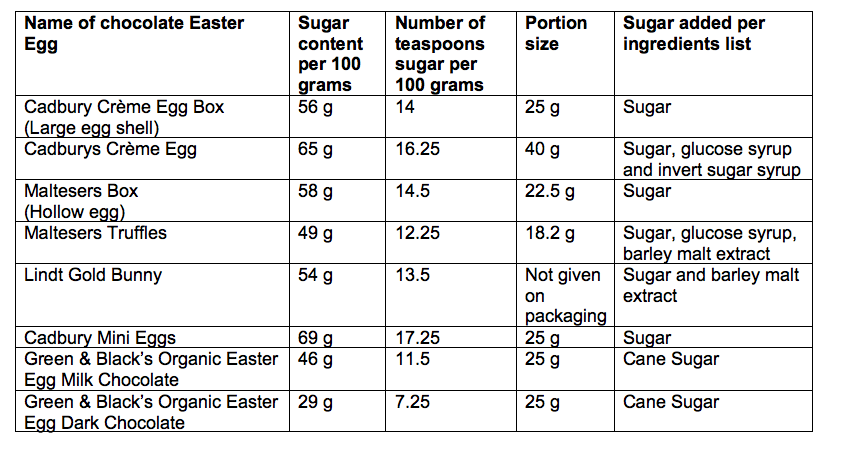Many children and some adults love Easter chocolate eggs. During this time, as we approach Easter, we are either buying them for ourselves or to give as gifts. Today, I would like to share what to look for when buying these. I’m seeing them everywhere, from my local newsagent, supermarkets, health stores to petrol stations, and they are so tempting, especially as packaged beautifully in colourful boxes.
One of the problems is that once you start eating Easter eggs, it’s hard to stop as they contain sugar, which has addictive properties and makes us feel good, so we keep wanting more. And overindulging can be harmful to your health because:
- Excessive sugar means they are also high in calories. And overconsumption of Easter eggs may therefore lead to weight gain which is associated with many chronic diseases like Type 2 Diabetes and Heart Disease.
- Too much sugar can cause tooth decay.
- When you are snacking on Easter eggs through the day, it could lead to a loss of appetite which means that your regular meals might be skipped and you are missing essential nutrients.
- Effects your energy levels as high amounts of sugar causes a spike in your blood sugar level which then leads to a crash. This then can also affect your mood.
In the table below, I compare the sugar content in popular Easter eggs. Please note 1 teaspoon is about 4 grams of sugar.

As you can see these are high in sugar! Now, you don’t need to avoid Easter eggs. I love chocolate and eat it daily, so I’m going to show you how you can enjoy your Easter eggs guilt free.
Tips to avoid gaining weight:
- Read the labels to see how much sugar it contains and the types of sugars been added. Also, check how much you eat versus the recommended serving size on the packaging.
- Try and limit milk chocolate eggs as these are higher in sugar. Instead get those made with dark chocolate. And even if it’s a healthier egg made with dark chocolate, it may still be high in sugar so do read the nutritional information.
- Look for eggs with a smaller ingredients list and buy those with ingredients you understand. Some may have colourings, peservatives or palm oil.
- Choose quality over quantity. Buy eggs made with better quality ingredients. For instance, dark chocolate has less refined sugar and also contains antioxidants that provides some health benefits.
- Less is best. Don’t get large eggs or those filled with sweets as these add more empty calories. Get the hollow chocolate eggs or the smaller eggs/bunnies.
- Store in cupboards where you can’t easily see them. If these are on the kitchen counter, the temptation is there all the time and you are depending on your willpower to resist.
- If you’re buying an Easter egg for a child that isn’t fond of dark chocolate, then consider reducing their portions. You can also begin to disassociate Easter with just chocolate eggs by giving children gifts that don’t contain sugar or by playing games that don’t involve sugary snacks at all. Make Easter break a time not just for food but also for spending time with family and friends. Get active and go for a walk or do an activity in your local park.
- Another good option for reducing sugar intake is make your own Easter eggs which could be a fun activity that your children could be involved in. You can melt some dark chocolate and make it in using an Easter egg mould. This way you get to keep them entertained whilst having control over how much sugar is eaten.
- Enjoy just over Easter, rather than getting too many and having it for weeks before and after. Once Easter is over and you still have unopened eggs, best to give these away or you will be tempted to eat them. Can share with family or friends or drop to a charity food collection. You don’t need to eat all the chocolates given to you.
As you can see you don’t need to stop eating Easter eggs, you just need to be aware of your portion sizes and look at the quantity and quality of what you are eating.
Having eaten too much sugar, if you want to do a sugar cleanse after Easter, come and join my 5-Day Sugar Free Challenge.
